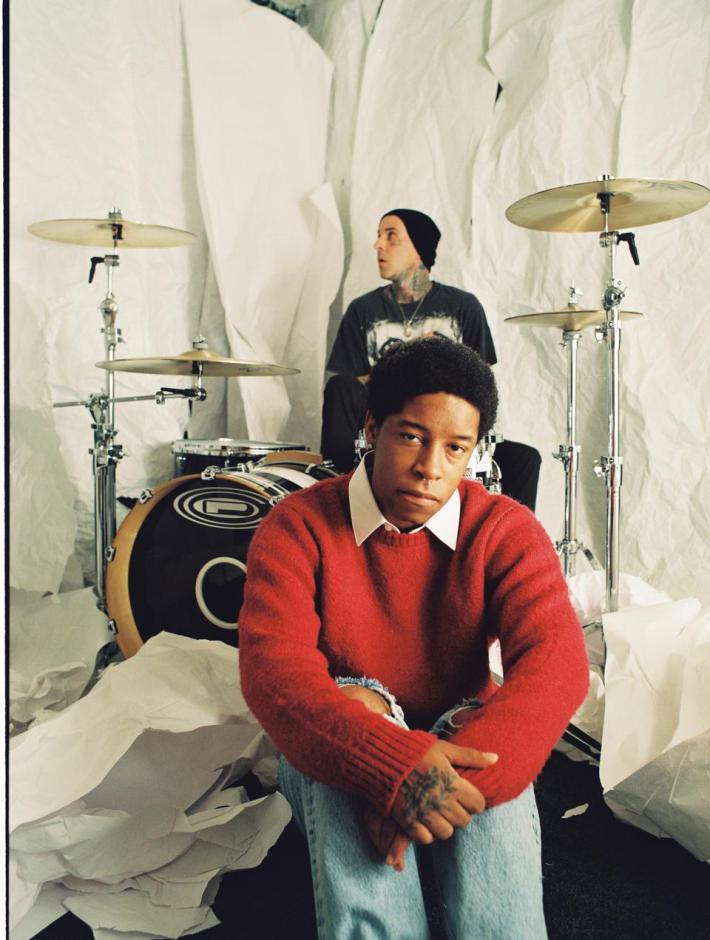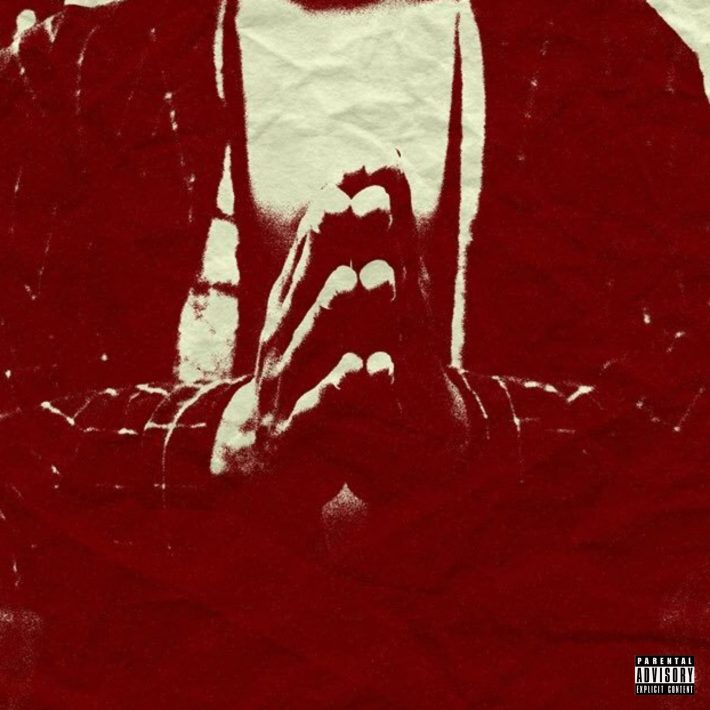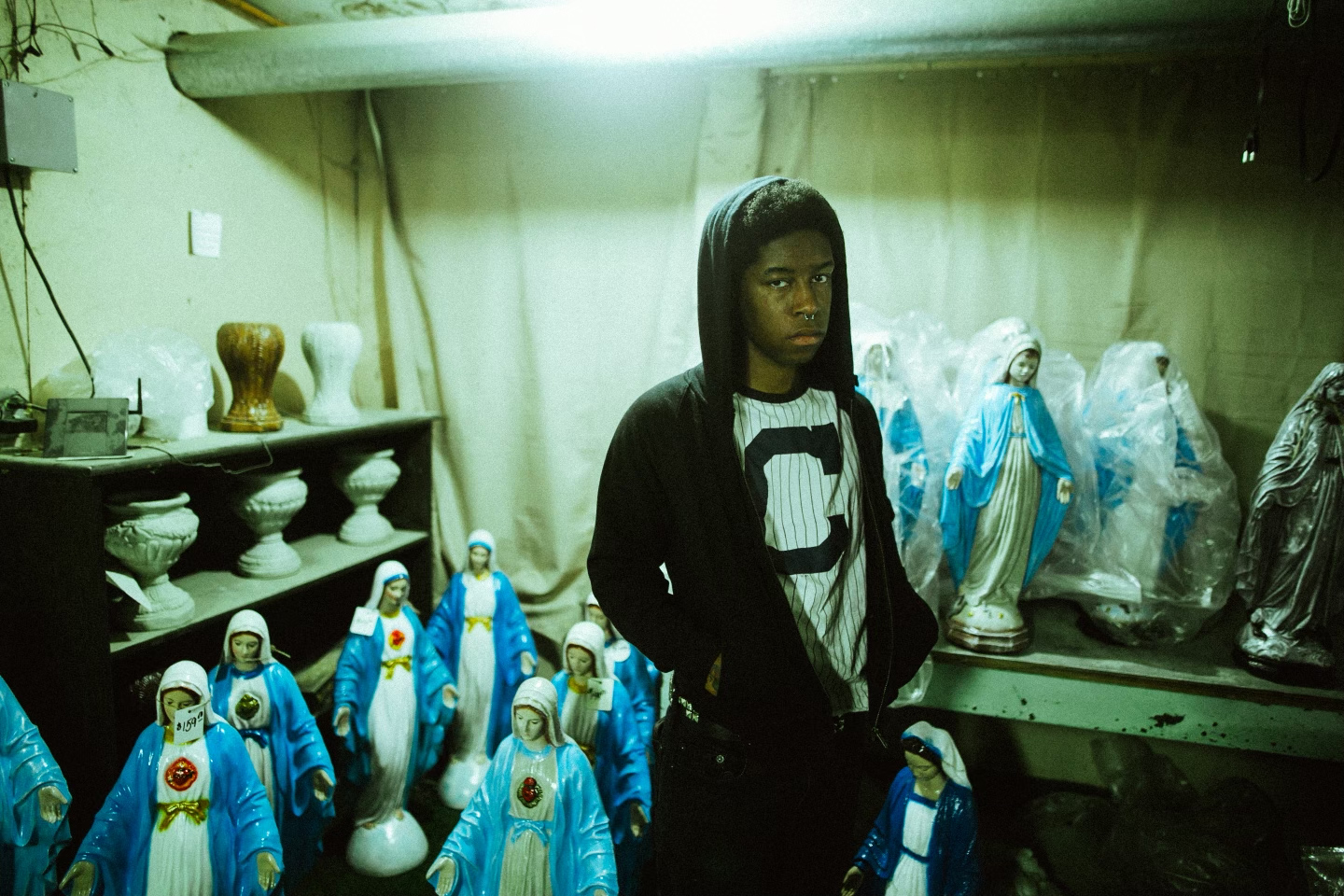The Wisconsin native on building a legacy, gaining traction as a Black rock artist, and working with Travis Barker on his impressive new mixtape SURVIVORS GUILT
"I'm just trying to make the anthems we don't have yet," Kenneth La'ron, better known as KennyHoopla, says over Zoom. The 23-year-old rock artist is known for his poeticism, but he's no fan of interviews. In previous conversations, he’s recognized how difficult it is to capture truth within the format of a half-hour call. He apologizes a lot at the starts and ends of his responses ("I say sorry a lot by the way") as well as backtracks, qualifies, and comments on his own sentences ("Man, I feel like I'm giving horrible answers"). So in the middle, when he does speak confidently, these larger statements feel earnest and believable.
Hoopla has an ability to reach across music history and pull from different genres and eras, from '80s goth to 2000s pop-punk, and he frequently speaks about achieving a similar longevity that will have other artists looking to him as a touchstone decades later. "I just wanted to make some good music," he says. "I want it to speak something for the times of now. I want it to be timeless looking down the line. I want it to be a classic. But I think a lot of things that become classic give a feeling of the now."
A feeling of the now certainly courses through KennyHoopla's new SURVIVORS GUILT: THE MIXTAPE. Released last Friday, the project adds him to a growing list of artists who’ve dived headfirst into pop-punk with production by blink-182 drummer Travis Barker, a class that includes Machine Gun Kelly, Willow Smith, Trippie Redd, and more. Furthermore, it arrives at a time when artists of color are gaining more attention within predominantly white rock scenes as listeners reckon with their biases in the wake of the Black Lives Matter movement.
The exposure is great, but a Black artist like KennyHoopla still runs the risk of being defined first by his race and second by the type of music he makes. "Now I have to prove myself, because I can't play guitar, I don't traditionally have a band, and I'm Black," he says. "And now I have to push even harder just to get out of this whole like, 'Oh, listen to me because I'm a Black artist and I make rock.'" Given his desire to leave behind a meaningful legacy, upon signing to the newly relaunched Arista Records in 2018, he was wary of a big promotional push without first building an audience and a catalog to justify the hype: "When I signed I didn't even talk to anyone on my label because I was like, 'I want to make sure that I'm here for a reason.'"
KennyHoopla spent his childhood in Oshkosh, Wisconsin and Cleveland, Ohio. "I grew up, like, technically rough," he says. "I didn't have the most fortunate things." He didn’t enjoy the same background, training, or career path as many others in the music industry, where wealth and connections often prevail. But he's careful not to paint himself as the victim: “I didn't come up off of my sob story, I came up off of what I did with it, and how I got out of it and how I made something bigger out of it. And then when all that’s said and done, then I'll talk about where I came from."
Hoopla grew up listening to a lot of hip-hop but discovered pop-punk in the form of blink-182 and All-American Rejects. He developed a love for rock music even though most of the people around him, including family members, didn’t like it. The indifference toward pop-punk within his social circle was so widespread that he didn't even think of it as being all that popular. "My mom liked rock music, but most Black people I was around, they just didn't listen to rock," Kenny said. "But then it's interesting, because there’s other sides of it. Maybe they didn't like rock because it was associated with whiteness. I grow up and then I'm like, 'Maybe it was institutionalized not to like it.'"
He began uploading music to SoundCloud in 2016, the year he released his mixtape Beneath The Willow Tree//. A series of singles followed over the next few years, including "lost cause//," which went on to have remixes featuring grandson and the Neighbourhood's Jesse Rutherford. Last year's how will i rest in peace if i’m buried by a highway?// EP blended together indie rock, post-punk, new wave, hip-hop, and trap and brought him widespread acclaim and coverage, but KennyHoopla feels like he can do better. "It feels weird because it's so early, and I feel like I haven't even really tried yet," he says. "I haven't even, like, peeled the scab or tapped into anything."
Last fall, he released "estella//," the lead single from SURVIVORS GUILT. The song placed him firmly within the current pop-punk resurgence. His next single "hollywood sucks//" continued that trajectory, calling out LA culture over distorted punk riffs and power chords. The mixtape as a whole trades the indie rock style of his last EP for a more pop-punk sound that at times tips over into straight-up punk. Although KennyHoopla's discography navigates a wide spectrum of sounds, rather than reject the concept of genre, he finds it useful. "If I do go into different genres I kind of go all the way with it," he says. While there are nostalgic moments and songs like "estella//" take plenty of cues from 2000s pop-punk, much like on his previous release, he's put his own twist on the sounds, overlaying them with the indie sensibilities he’s become known for in the last year. In a way, he’s achieved his goal of making classics that speak to their moment.
With that in mind, SURVIVOR'S GUILT isn't a complete break from the eclecticism of his previous work; there’s a fair amount of variation within the mixtape's pop-punk template. Hoopla borrows from emo, punk, and post-hardcore throughout, and songs like opener "silence is also an answer//" swell with the glittering indie-pop sound of his previous EP. The initially straightforward pop-punk tracks "inside of heaven’s mouth there is a sweet tooth" and "survivors guilt//" explode into screamed vocals. "9-5 (love me)//" exudes the drama of classic emo, suddenly shifting from quiet to epic.
Similarly, his lyrics juxtapose sweeping grandeur with everyday banality. "I challenge you to a duel/ Maybe out on your smoke break," he sings on "smoke break//." On "hollywood sucks//," he jumps from thought to thought, from the existential to the trivial. It seems effortless and at times downright ridiculous, so that in the end it can only feel like the natural wandering of the mind, an outflow of the way he talks. "Hollywood sucks, can you please move your Prius?/ You are not fucking Jesus, he hates LA," he sings on the single, just after declaring, "I think your forehead is beautiful."
SURVIVOR'S GUILT references typical pop-punk subject matter -- love, betrayal, despondency, skating, being "stuck in this town" -- but he weaves in some more compelling threads such as time ("Don't you worry as the clock spins") and death ("I think of death way more than life/ And if my coffin will have handles"). SURVIVOR'S GUILT is a nonstop rush of energy, as electrifying as it is devastating in its darker moments, where the dizzying instrumentation comes together to convey a sense of overwhelming loss to match these heavier topics. As he sings at one point, "Survival is subjective."
Unsurprisingly considering Barker's involvement, there are echoes of blink-182 all over the mixtape, especially on songs like "turn back time//." It's not just Barker’s signature bombastic drum fills but also the distinctive bass riffs and exuberant melodies that emulate the pop-punk veterans. With its singalong chorus, staccato guitars, and quick verses, "turn back time//" could have come off of a later blink record. "It's crazy," Hoopla says about working with an artist he's admired for years. "I still can't believe it. It was a blessing really. I feel like I grew as an artist." He aspires to be "ideally like a Travis Barker one day, as fucking corny as that sounds. Like an OG, like someone that matters. I want to make a difference, truly and I feel like I care about it enough."

Hoopla is off to a good start but still has a ways to go. Though he has achieved a lot in the past year, he feels like he's still working toward making the art he wants to make. "I'm still trying to get the right team around me," he says. "Most of my videos, I cringe out at. A lot of times, it wasn't what I was trying to get at with most of my art." He says he knows what he wants from his music, but hasn't executed it yet: "I can hear hints of it in my music, of what I'm trying to get at." Hoopla says he and Barker spent roughly two and a half weeks in the studio -- the longest he says he's ever worked on a project -- but he still feels this mixtape and his previous EP weren’t fully realized. "I just feel like I never get to have enough time to really work on anything," he said. "We did what we could with the days we had, but I pray it puts me in a situation where I can have more respect and move the way I want to move and be able to work the way I need to work."
Hoopla is hungry to make the music he wants and is striving to improve as an artist. "It's about giving slappers and giving people something to live to,” he said. "And getting better with my words, and growing as a person, and learning how to use every piece of my brain, and tapping into myself, and being able to write paragraphs about a single smell in a room. Just trying to be the best human I can."

SURVIVORS GUILT: THE MIXTAPE is out now on Arista.






